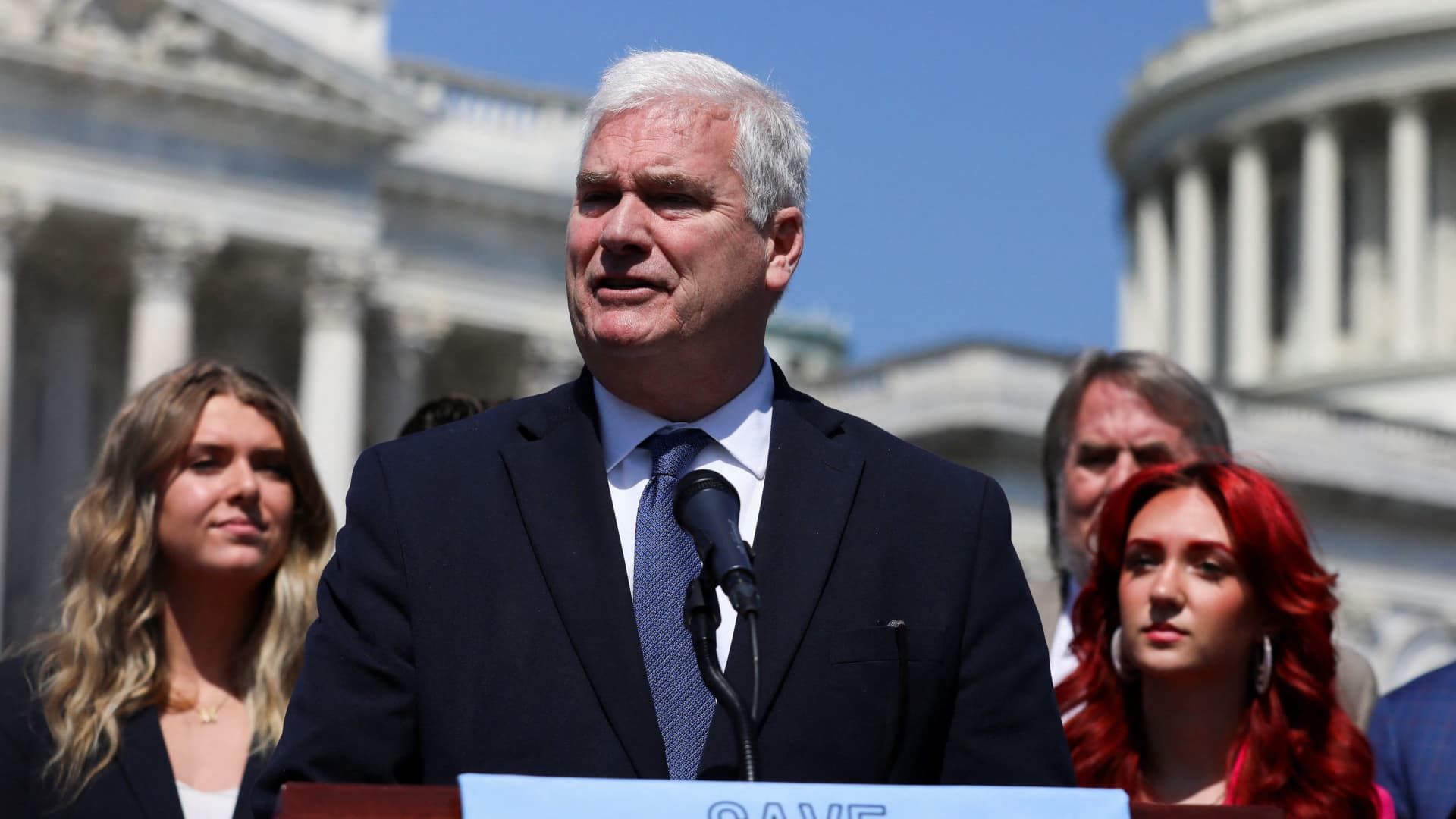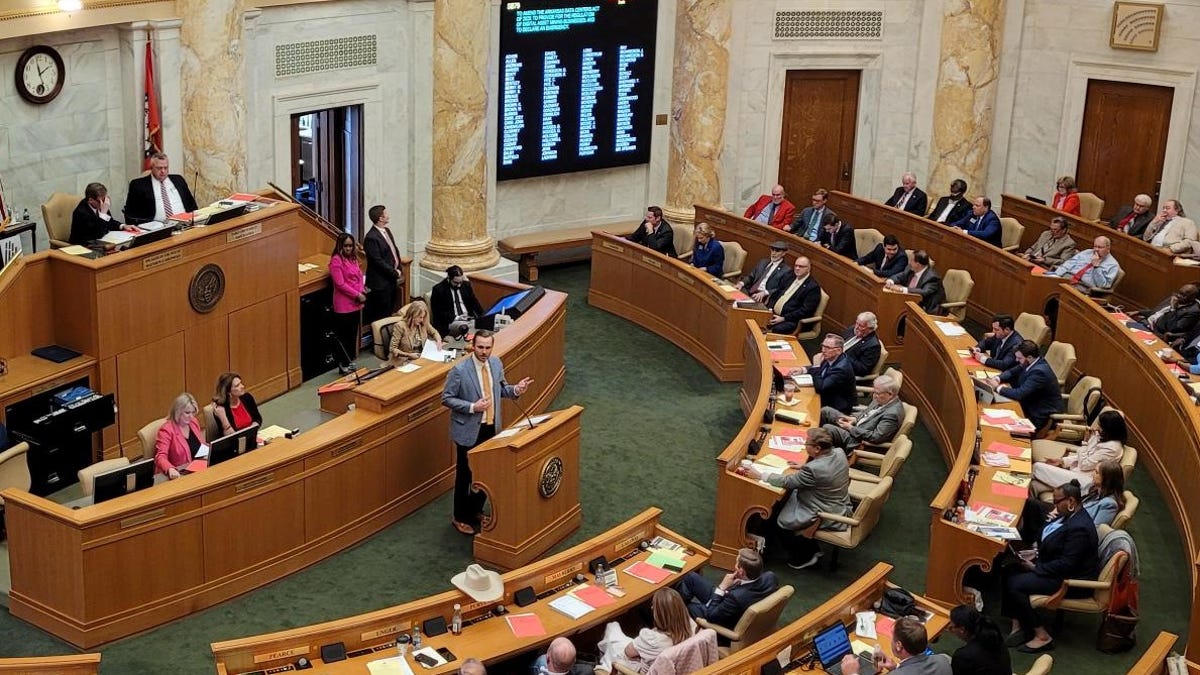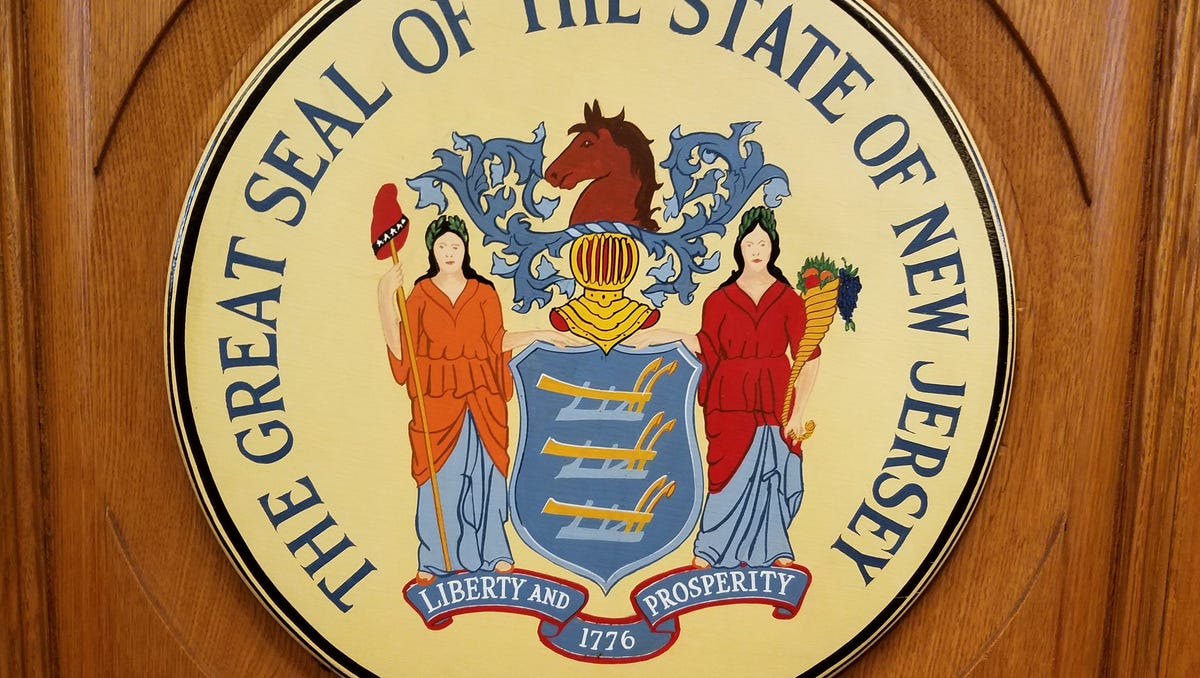Majority Whip Tom Emmer (R-MN) speaks at a news conference with female athletes, following the expected House passage of the “Protection of Women and Girls in Sports” Act, on Capitol Hill in Washington, April 20, 2023.
Amanda Andrade-Rhoades | Reuters
Deeply divided Republican lawmakers this week are trying to coalesce around a nominee for speaker of the House of Representatives for a third time, after their two previous candidates failed to secure enough backing in the party.
The speaker race is now wide open with nine GOP lawmakers running for the party’s nomination after Ohio Rep. Jim Jordan’s bid for the gavel failed in three votes last week.
The House has been leaderless for well over two weeks, with no resolution in sight, leaving Congress paralyzed as the clock ticks toward a Nov. 17 deadline to avoid a government shutdown. President Joe Biden has also called on lawmakers to pass urgent security assistance for Israel and Ukraine.
House Republicans will hold a closed-door candidate forum at 6:30 p.m. ET Monday, with an internal party vote scheduled for 9 a.m. ET Tuesday to select the next GOP nominee.
Interim House Speaker Patrick McHenry of North Carolina said he wants the nominee to face a House vote as soon as Tuesday.
Republicans ditched Jordan on Friday. His failure came after the party’s original nominee, House Majority Leader Steve Scalise of Louisiana, bowed out of the race because he could not secure enough GOP votes. It is deeply uncertain whether any of the nine candidates can succeed where Jordan and Scalise failed.
Democrats have lined up in lockstep behind their nominee, House Minority Leader Hakeem Jeffries of New York. This means the GOP nominee can only lose four Republican votes given the party’s narrow majority in the House.
Only two of the nine GOP candidates, Majority Whip Tom Emmer of Minnesota and Rep. Austin Scott of Georgia, voted to certify President Joe Biden’s victory in 2020 presidential election. The other seven GOP speaker candidates objected to Biden’s victory in either Arizona or Pennsylvania or both, after a mob of former President Donald Trump’s supporters sacked the Capitol on Jan. 6 2021. All of the candidates voted against establishing a commission to investigate the Jan. 6 riot.
Five of the nine GOP candidates voted in September for temporary spending legislation to avoid a government shutdown.
These are the nine Republican candidates.
Tom Emmer of Minnesota
U.S. House Majority Whip Rep. Tom Emmer (R-MN) speaks with members of the media following passage in the House of a 45-day continuing resolution on September 30, 2023 in Washington, DC.
Nathan Howard | Getty Images
Republican Majority Whip Tom Emmer has the backing of former Speaker Kevin McCarthy of California, whose ouster by a rebel GOP faction triggered the current leadership crisis in the House.
“He sets himself head and shoulders above all those others who want to run,” McCarthy said of Emmer in an interview with NBC News on Sunday. “We need to get him elected this week and move on and bring this not just party together but focus on what this country needs most.”
The Minnesota Republican voted to certify the 2020 presidential election results. He voted to fund the government in September.
Austin Scott of Georgia
U.S. Rep. Austin Scott (R-GA), who finished second in voting behind Rep. Jim Jordan (R-OH) in a bid to become the next Speaker of the House, talks with reporters following a House Republican Conference meeting in an effort to pick a new leader for the U.S. House of Representatives on Capitol Hill in Washington, October 13, 2023.
Kevin Lamarque | Reuters
Rep. Austin Scott ran against Jordan for the GOP nomination earlier this month, but lost to the Ohio Republican. Jordan defeated Scott in a closed-door internal party 124 to 81.
Austin subsequently backed Jordan’s speaker bid. The Georgia Republican said he’s re-entering the race now that Jordan has withdrawn.
“If we are going to be the majority we need to act like the majority, and that means we have to do the right things the right way,” Scott said Friday in a social media post on “X.”
Scott voted to certify the 2020 presidential election results. He voted to fund the government in September.
Jack Bergman of Michigan
Rep. Jack Bergman
Source: Rep. Jack Bergman
Rep. Jack Bergman, a retired Marine Corps officer, slammed Republicans on Monday for leaving Washington without electing a speaker.
Bergman warned Congress faces a ticking clock to pass spending legislation by Nov. 17 to avoid a government shutdown.
“Congress should be in session every single day until we elect a Speaker and properly fund the government,” Bergman said on “X.”
The Michigan Republican objected to the 2020 presidential election results in Arizona and Pennsylvania.
Bergman voted to fund the government in September.
Byron Donalds of Florida
U.S. Rep. Byron Donalds (R-FL) speaks to reporters on the steps of the Capitol after Donalds was nominated as a candidate for Speaker of the House during voting for a new Speaker on the second day of the 118th Congress at the U.S. Capitol in Washington, January 4, 2023.
Jon Cherry | Reuters
Rep. Byron Donalds is a two-term lawmaker and member of the ultraconservative Freedom Caucus.
Republicans nominated Donalds several times in January in an effort to block McCarthy’s marathon bid to secure the gavel.
Donalds objected to the 2020 presidential election results in Arizona and Pennsylvania.
The Florida Republican did not cast a vote on the spending legislation in September.
Kevin Hern of Oklahoma
Rep. Kevin Hern (R-OK) speaks to the media after a committee meeting to discuss former President Donald Trump’s tax returns on Capitol Hill in Washington, December 20, 2022.
Evelyn Hockstein | Reuters
Rep. Kevin Hern of Oklahoma, chairman of the Republican study committee, said the GOP needs to rally behind whoever wins the nomination.
“Without that, you have anarchy,” Hern told Fox News on Monday.
“We can’t keep doing what we’re doing right now,” Hern said. “The world needs the House back open with what we’re seeing around the world, it’s imperative that we get the Republican party back in charge and America back in its leadership position.”
Hern objected to the 2020 presidential election results in Arizona and Pennsylvania.
The Oklahoma Republican voted against funding the government in September.
Mike Johnson of Louisiana
Rep. Mike Johnson, R-La., Vice Chair of the House Republican Conference, speaks during a television interview on Capitol Hill in Washington, Tuesday, Jan. 10, 2023.
Patrick Semansky | AP
Rep. Mike Johnson is the GOP deputy whip and vice chairman of the Republican conference.
Johnson said he previously deferred running for speaker out of respect for Jordan, Scalise and Scott.
“It is incumbent upon us now to decide upon a consensus candidate who can serve as a trusted caretaker and good steward of the gavel,” Johnson said in a letter to GOP lawmakers.
Johnson objected to the 2020 presidential election results in Arizona and Pennsylvania.
The Louisiana Republican voted against funding the government in September.
Dan Meuser of Pennsylvania
Newly elected House Representative Dan Meuser (R-PA) speaks to reporters during new members orientation at the Courtyard by Marriott, Navy Yard, in Washington, November 13, 2018.
Alexander Drago | Reuters
Rep. Dan Meuser is a businessman, member of the bipartisan House Problem Solvers Caucus, and former secretary of revenue in Pennsylvania.
Meuser said Monday whoever wins the nomination needs to ensure that speaker’s office is inclusive so the narrow GOP majority remains unified.
The Pennsylvania Republican told Fox Business that Republicans’ failure to elect a speaker has made the party “part of the dysfunction of Washington.”
Meuser objected to 2020 presidential election results in Pennsylvania, but not in Arizona.
He voted to fund the government in September.
Gary Palmer of Alabama
Republican U.S. Rep. Gary Palmer of Alabama, running for re-election to the U.S. House of Representatives in the 2022 U.S. midterm elections, appears in an undated handout photo provided October 11, 2022.
US House Of Representatives | via Reuters
Rep. Gary Palmer is chairman of the House Republicans’ policy committee.
Palmer vowed in a statement Sunday to move the party beyond its internal divisions.
The Alabama Republican objected to the 2020 presidential election results in Arizona and Pennsylvania.
Palmer voted against funding the government in September.
Pete Sessions of Texas
Rep. Pete Sessions, a Republican from Texas
Eric Thayer | Bloomberg | Getty Images
Rep. Pete Sessions said Monday he would make border security one of his top priorities as speaker.
Sessions indicated in an interview with Newsmax he would try to tie government funding to wall construction on the southern border: “We must solve our border issue,” Sessions said.
Sessions has served in Congress since the 1990s. He led the House Republican campaign arm when the GOP swept to victory in the 2010 midterm elections.
Sessions objected to the 2020 presidential election results in Arizona and Pennsylvania.
The Texas Republican voted to fund the government in September.


















/cdn.vox-cdn.com/uploads/chorus_asset/file/25420414/https___cdn.sanity.io_images_xq1bjtf4_production_87ece728b9322264b9f1341c3ea17e8081bfde78_5925x3949.jpg)

















